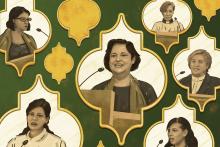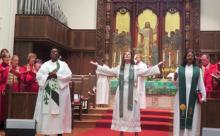female pastors

FOR YEARS, WOMEN called to leadership in the church in the Middle East have faced a stained-glass ceiling of limitations imposed by the surrounding patriarchal culture and theological presuppositions about the role of women in the church. But while some interpretations of Paul’s instructions to the early church (such as Timothy 2:12) are used as a rationale for limiting the role of women, long-standing cultural traditions regarding women’s roles in religion and society have played a more prominent, and more difficult, role.
“Although religion bears major responsibility for the inferior status of women, it cannot be solely blamed for the gender problem in the Middle East,” according to a report on “Women in the Middle East” published by the Institute for Policy Studies. “In reality, the role of culture has been even more prominent in perpetuating the oppression of women.”
Most denominations in the Middle East (other than Orthodox communions and the Catholic Church) do not prevent the ordina-tion of women for theological reasons. And many Protestant communions, such as the Lutherans and Presbyterians—which have been present in the Middle East since 19th century missionary encounters—ordain women in churches around the world. While Orthodox churches do not have women in positions of clerical leadership, Father George Massouh, then-head of the Center for Christian-Muslim Studies at the University of Balamand in Lebanon, explained in 2017 that the reason is not because of “theological hindrance.” Rather, Massouh said, the absence of ordained women in Eastern churches “was due to social customs”—the Orthodox church, he said, “has no such tradition, whether in Lebanon or anywhere else in the world.”

Chicago. New York. Washington, D.C. In quick succession this year, three women have been chosen to lead historic tall-steeple churches in all these cities.
In May, the Rev. Shannon Johnson Kershner became the first woman solo senior pastor at Chicago’s Fourth Presbyterian Church. In June, the Rev. Amy Butler was elected senior pastor of New York City’s Riverside Church. And finally, in July, the Rev. Ginger Gaines-Cirelli began leading Foundry United Methodist Church in Washington, D.C.
“For women to speak in those pulpits and speak boldly as public voices in these very public buildings is very powerful,” said the Rev. Serene Jones, president of Union Theological Seminary, who recently hosted a dinner party with some of New York’s movers and shakers to welcome Butler to town.
It’s been 40 years since the Episcopal Church first ordained women, and other denominations have long included women in their clergy ranks. But these new advances are occurring sooner in the lives of these three women than some of their older counterparts. The Hartford Institute for Religion Research reports that women clergy are much more likely to serve in smaller congregations.
Scholar Diana Butler Bass hailed the arrival of these women — all in their 40s and leading large, urban, neo-Gothic churches — but also wondered if they reflect the “General Motors phenomenon.”
“Are women coming into leadership only as the institutions are collapsing?” asked Bass, author of Christianity After Religion.
Last year Naomi Tutu and I met on the steps of the Lincoln Memorial to keep vigil on the 40th anniversary of the martyrdom of the Rev. Dr. Martin Luther King Jr. Friends joined us from around the country. We asked the visitors gathered there: "What keeps us from living the Dream?" Most folks spoke of fear. Some spoke of ignorance.
Just recently, more than 100 bookstores controlled by the Southern Baptist Convention (SBC) removed the recent issue of Gospel Today-an issue whose cover highlighted the gospel-work of women.